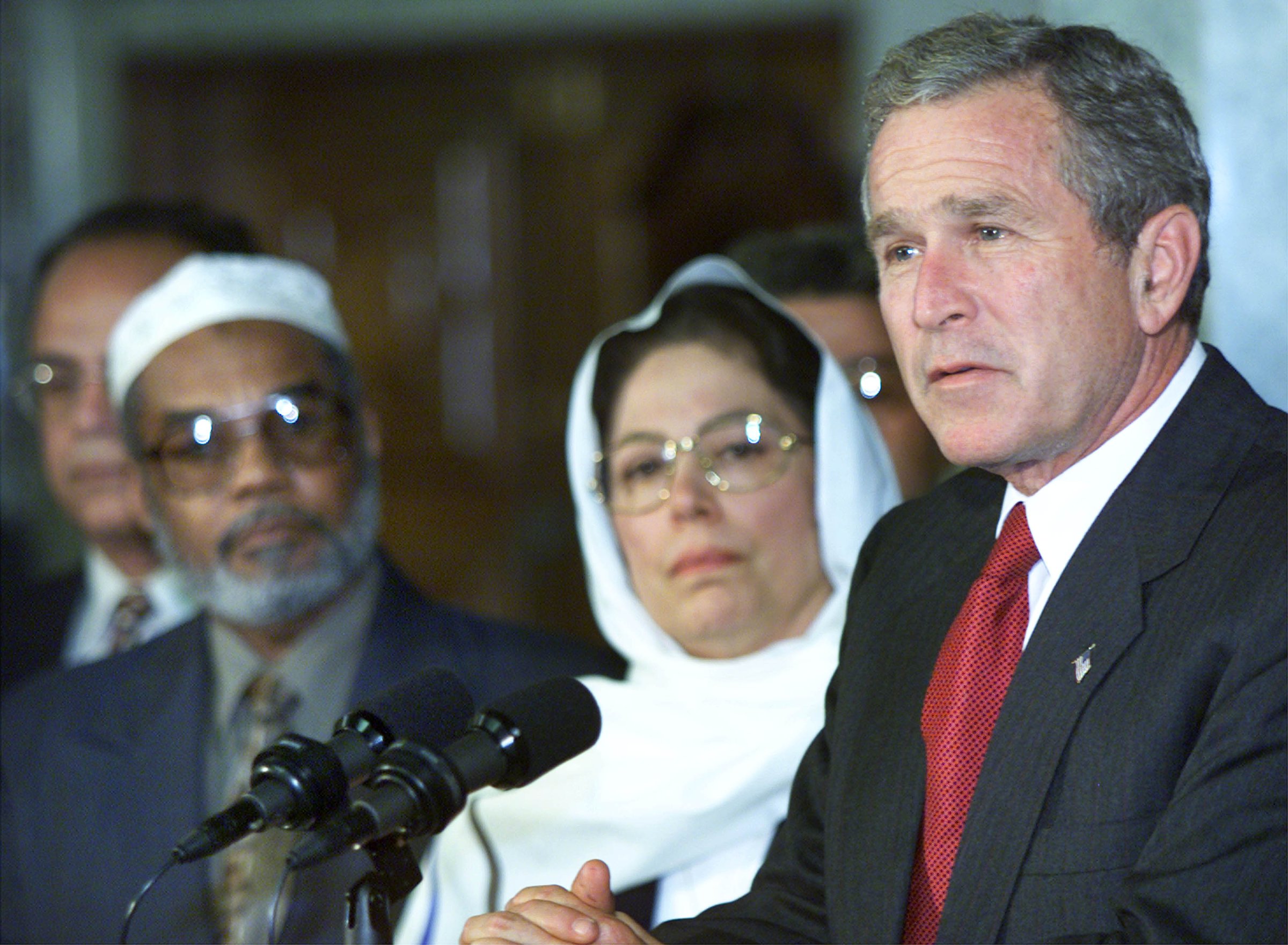
When I went for an unexpected MRI at a local hospital two weeks ago, I was nervous. I was raising a family. I had children depending on me. My racing thoughts focused on potential doom.
Then I met Hanadi. Wearing a hijab, she emerged from the sterile technician’s room to greet me and walk me through the process. She smiled, was kind and calmed my nerves.
As my body slid into the long, thin, claustrophobic tube of a machine, I had a moment of dread. She sensed it, held my hand and said, “I will stay right here with you for the next 45 minutes.” Throughout the entire procedure, she stood next to me and kept checking on me and smiling, making sure I was okay. I could see her profile through the mirror on the mask they gave me to wear in the machine.
I lay there and thought of the current national debate about banning Muslims from the United States.
On 9/11, I was director of the White House Domestic Policy Council. My team and I were scheduled to have a meeting with top American Muslim leaders that afternoon in the Roosevelt Room with President Bush and the faith-based czar, John DiIulio. We were supposed to discuss the role of faith-based institutions—in this case, those run by Muslims—in helping the poor and needy, and the barriers these groups faced in competing for federal funds on an equal footing with their secular counterparts.
Then 19 terrorists hijacked four jetliners and turned the planes against the American people.
Six days later, President Bush visited the Islamic Center of Washington. He removed his shoes as he entered the mosque to meet with various Muslims leaders. Surrounded at the lectern by Muslims, whom he called “friends” and “taxpaying citizens,” President Bush stated, “These acts of violence against innocents violate the fundamental tenets of the Islamic faith. And it’s important for my fellow Americans to understand that.”
He quoted the Quran, apologizing that the English translation was apparently not as eloquent as the original Arabic. He emphasized again that Islam is a religion of peace. He reminded the country, “America counts millions of Muslims amongst our citizens, and Muslims make an incredibly valuable contribution to our country. Muslims are doctors, lawyers, law professors, members of the military, entrepreneurs, shopkeepers, moms and dads. And they need to be treated with respect. In our anger and emotion, our fellow Americans must treat each other with respect.”
Our dialogue from current and former candidates for public office in our country—such as Donald Trump and Governor Sarah Palin—is very distant from this moment at the mosque. And it is very different from the White House leadership that would prompt the donation of $12 million in pennies, nickels and dimes by American schoolchildren who, after 9/11, reached out and helped through the newly created America’s Fund for Afghan Children.
Over time, as the government tried to pursue the twin goals of preserving liberty and maintaining security, there continued to be great fear among the public, our security improved, and some policies and practices were misguided and overreached. Fifteen years later, our nation continues to struggle with the balance between ensuring our safety and preserving our freedom.
But having respect for all Americans and all religions made our country safer after 9/11. Muslims have helped deter attacks from those who were spreading hate in the name of Islam. All of this reflected American ideals of religious freedom, tolerance and an appreciation of our common humanity.
There are 3.3 million Muslims in the United States, and by 2040, Muslims are projected to become the second-largest religious group in our country. They represent about 10 percent of legal immigrants to America.
My Muslim friend, Ambassador Akbar Ahmed, the Ibn Khaldun Chair of Islamic Studies at American University, reminded me that one of the most popular poets in America is Jalaluddin Rumi, a Sufi Mystic from the Islamic Golden Age. Rumi once said, in words that could define our best response after 9/11, “the wound is the place where the Light enters you.”
As I reflect on today’s debate over Muslims in America, I think of Hanadi, standing next to me, making me feel safe.
More Must-Reads from TIME
- Breaking Down the 2024 Election Calendar
- How Nayib Bukele’s ‘Iron Fist’ Has Transformed El Salvador
- What if Ultra-Processed Foods Aren’t as Bad as You Think?
- How Ukraine Beat Russia in the Battle of the Black Sea
- Long COVID Looks Different in Kids
- How Project 2025 Would Jeopardize Americans’ Health
- What a $129 Frying Pan Says About America’s Eating Habits
- The 32 Most Anticipated Books of Fall 2024
Contact us at letters@time.com